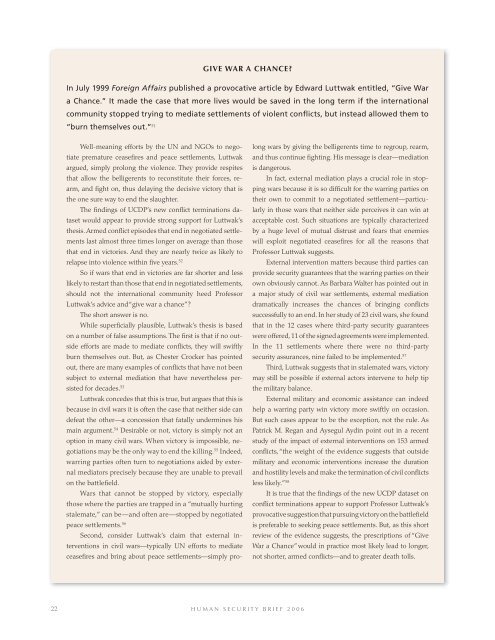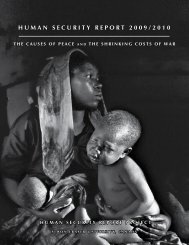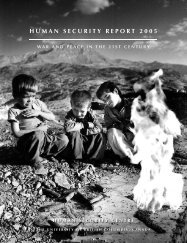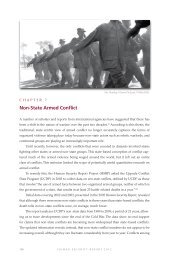H U M A N S E C U R I T Y B R I E F 2 0 0 6
H U M A N S E C U R I T Y B R I E F 2 0 0 6 - Human Security Report ...
H U M A N S E C U R I T Y B R I E F 2 0 0 6 - Human Security Report ...
Create successful ePaper yourself
Turn your PDF publications into a flip-book with our unique Google optimized e-Paper software.
GIVE WAR A CHANCE?In July 1999 Foreign Affairs published a provocative article by Edward Luttwak entitled, “Give Wara Chance.” It made the case that more lives would be saved in the long term if the internationalcommunity stopped trying to mediate settlements of violent conflicts, but instead allowed them to“burn themselves out.” 51Well-meaning efforts by the UN and NGOs to negotiatepremature ceasefires and peace settlements, Luttwakargued, simply prolong the violence. They provide respitesthat allow the belligerents to reconstitute their forces, rearm,and fight on, thus delaying the decisive victory that isthe one sure way to end the slaughter.The findings of UCDP’s new conflict terminations datasetwould appear to provide strong support for Luttwak’sthesis. Armed conflict episodes that end in negotiated settlementslast almost three times longer on average than thosethat end in victories. And they are nearly twice as likely torelapse into violence within five years. 52So if wars that end in victories are far shorter and lesslikely to restart than those that end in negotiated settlements,should not the international community heed ProfessorLuttwak’s advice and “give war a chance”?The short answer is no.While superficially plausible, Luttwak’s thesis is basedon a number of false assumptions. The first is that if no outsideefforts are made to mediate conflicts, they will swiftlyburn themselves out. But, as Chester Crocker has pointedout, there are many examples of conflicts that have not beensubject to external mediation that have nevertheless persistedfor decades. 53Luttwak concedes that this is true, but argues that this isbecause in civil wars it is often the case that neither side candefeat the other—a concession that fatally undermines hismain argument. 54 Desirable or not, victory is simply not anoption in many civil wars. When victory is impossible, negotiationsmay be the only way to end the killing. 55 Indeed,warring parties often turn to negotiations aided by externalmediators precisely because they are unable to prevailon the battlefield.Wars that cannot be stopped by victory, especiallythose where the parties are trapped in a “mutually hurtingstalemate,” can be—and often are—stopped by negotiatedpeace settlements. 56Second, consider Luttwak’s claim that external interventionsin civil wars—typically UN efforts to mediateceasefires and bring about peace settlements—simply prolongwars by giving the belligerents time to regroup, rearm,and thus continue fighting. His message is clear—mediationis dangerous.In fact, external mediation plays a crucial role in stoppingwars because it is so difficult for the warring parties ontheir own to commit to a negotiated settlement—particularlyin those wars that neither side perceives it can win atacceptable cost. Such situations are typically characterizedby a huge level of mutual distrust and fears that enemieswill exploit negotiated ceasefires for all the reasons thatProfessor Luttwak suggests.External intervention matters because third parties canprovide security guarantees that the warring parties on theirown obviously cannot. As Barbara Walter has pointed out ina major study of civil war settlements, external mediationdramatically increases the chances of bringing conflictssuccessfully to an end. In her study of 23 civil wars, she foundthat in the 12 cases where third-party security guaranteeswere offered, 11 of the signed agreements were implemented.In the 11 settlements where there were no third-partysecurity assurances, nine failed to be implemented. 57Third, Luttwak suggests that in stalemated wars, victorymay still be possible if external actors intervene to help tipthe military balance.External military and economic assistance can indeedhelp a warring party win victory more swiftly on occasion.But such cases appear to be the exception, not the rule. AsPatrick M. Regan and Aysegul Aydin point out in a recentstudy of the impact of external interventions on 153 armedconflicts, “the weight of the evidence suggests that outsidemilitary and economic interventions increase the durationand hostility levels and make the termination of civil conflictsless likely.” 58It is true that the findings of the new UCDP dataset onconflict terminations appear to support Professor Luttwak’sprovocative suggestion that pursuing victory on the battlefieldis preferable to seeking peace settlements. But, as this shortreview of the evidence suggests, the prescriptions of “GiveWar a Chance” would in practice most likely lead to longer,not shorter, armed conflicts—and to greater death tolls.22H U M A N S E C U R I T Y B R I E F 2 0 0 6






